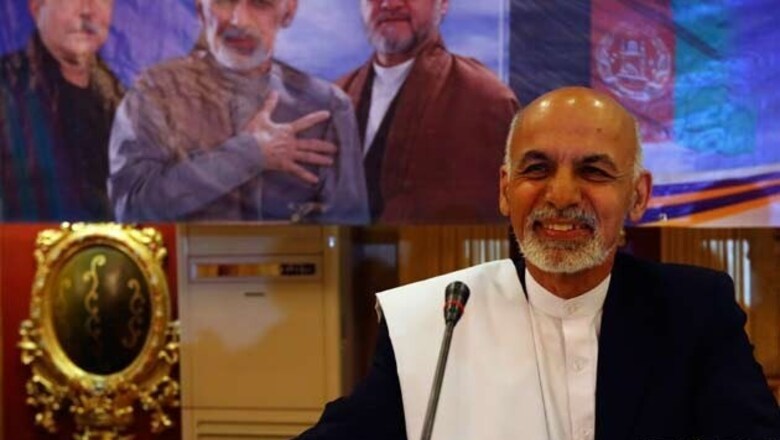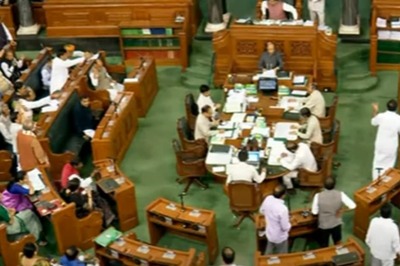
views
Kabul: Former World Bank economist Ashraf Ghani won Afghanistan's presidential election, according to preliminary results on Monday, but his poll rival Abdullah Abdullah rejected the outcome as "a coup against the will of the people".
Fraud allegations immediately sparked a dispute and stoked concerns of instability after the figures showed Ghani collected 56.4 per cent of the run-off vote against ex-foreign minister Abdullah's 43.5 per cent.
Turnout on June 14 was more than eight million out of an estimated electorate of 13.5 million, far higher than expected, and a figure likely to fuel fierce arguments about fraud from both sides.
The next president will lead Afghanistan at a pivotal time as US-led troops end their 13-year war against Taliban insurgents, and the fragile economy struggles with declining international aid.
"We can not deny fraud and violations in the process," Independent Election Commission (IEC) head Ahmad Yusuf Nuristani told reporters.
"In some cases some security forces were involved, in other cases senior government officials like governors or lower-level officials were involved."
Nuristani emphasised that the results would now be subject to auditing and adjudication of complaints, before the official result released on about July 24.
"The preliminary result in no way means the announcement of the winner of the election," he said. "A change in the result is possible."
Last-minute talks delayed the results by nearly five hours on Monday, as the two campaigns tried to thrash out a deal over a proposed fraud probe that could yet derail Afghanistan's first democratic transfer of power.
"The announcement of results was a coup against the will of the people," Mujib Rahman Rahimi, a spokesman for Abdullah, told AFP.
"We don't recognise the result and we have cut off all contact with the IEC and Ghani's team."
In contrast, Ghani welcomed the announcement, with campaign spokeswoman Azita Rafat saying: "We worked hard and saw the result, but we don't want to prejudge the final results."
Ghani supporters celebrated in Kabul by banging drums and firing guns in the air, while small groups of Abdullah supporters drove cars around the city in protest.
- Worst fears realised -
Negotiations over the fraud investigation have centred on how many of the total 23,000 polling stations will be put through an audit to sort out clean votes.
Ghani, an academic who spent 24 years living outside Afghanistan before 2001, has agreed to an audit of 7,000 suspect polling stations, his team said.
Abdullah's campaign has demanded 11,000 stations are re-examined.
The US State Department said after Monday's result that it expected at least three million votes to be checked from 7,000 stations.
"Serious allegations of fraud have been raised and have yet to be adequately investigated," the US statement said, describing the result as "not final or authoritative."
Afghanistan's international backers have lobbied hard to try to ensure a smooth election process, but the contested outcome realised their worst fears and risks setting back gains made since the fall of the Taliban in 2001.
The deadlock has already tipped Afghan politics into a crisis at the same time that the Taliban have underlined their strength with a major offensive in the southern province of Helmand.
The insurgents, who see the election as a US plot to control Kabul, threatened to target voters, and violence spiked on both polling days, but there was no major militant attack.
Afghanistan has been battered by decades of conflict, and any power struggle would undermine claims that the hugely costly US-led military and civilian mission has helped to establish a functioning state.
It could also threaten billions of dollars of aid pledges, boost the insurgents and fan ethnic unrest.
Ghani attracts much of his support from the Pashtun tribes of the south and east, while Abdullah's loyalists are Tajiks and other northern Afghan groups -- echoing the ethnic divisions of the bloody 1992-1996 civil war.
The UN mission in Afghanistan has highlighted the risk of political tensions spilling over into tribal violence, though protests have so far been peaceful.
President Hamid Karzai, who has ruled since the fall of the Taliban in 2001, is constitutionally barred from a third term in office, and he has not publicly endorsed any candidate.
He is due to hand over power at an inauguration ceremony on August 2.
All foreign combat troops will leave Afghanistan by December, with about 10,000 US troops staying into next year if the new president signs a security deal with Washington.
















Comments
0 comment